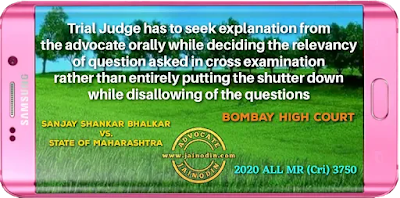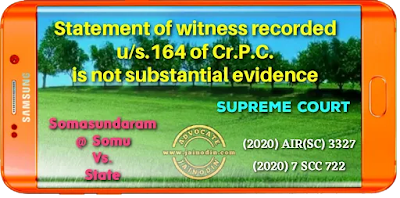
17 July 2021
Court should not assume the role of prosecution or defence lawyer and put the questions to the witnesses to jeopardise the prosecution case or the defence of the accused

13 July 2021
For proving the offence of forgery u/s.465 of IPC, it must be proved as to who did it
23 June 2021
voluntary presents given at or before or after the marriage to the bride or the bridegroom, out of love and affection is not dowry
19 June 2021
Continuous and consensual sex between two adults cannot be considered as Rape
28 May 2021
Misuse and or abuse of powers by public servant is not a part of their official duties so no protection u/s.197 of CrPC is available
If the authority vested in a public servant is misused for doing things which are not otherwise permitted under the law, such acts cannot claim the protection of Section 197 Cr.P.C.
29 April 2021
Cr.P.C. does not provide any provision for service of summons through Whatsapp
Going by Section 65 of Cr.P.C, if service could not be effected as provided under Section 62, the serving officer shall affix one of the duplicates of the summons to the conspicuous part of the house or homestead in which the person summoned ordinarily resides. Thereafter, the court should make such enquiries as it thinks fit and either declare the summons to have been duly served or order fresh service in such manner as it considers proper. As per Rule 7 of the Criminal Rules of Practice, Kerala, summons issued to the accused and witnesses shall ordinarily be signed by the Chief Ministerial Officer of the Court and the words “By order of the Court” shall invariably be prefixed to the signature of the Ministerial Officer. [Para No.3]
11 April 2021
Death caused; without any premeditation, in a sudden fight, in the heat of passion, without taking any undue advantage or acted in a cruel or unusual manner, is not a murder
"19. Consequently, we are convinced thatsince the death of Suraj Mal and Shri Ram had occurred due to the firing resorted to as part of his self-defence, the same would amount to culpable homicide not amounting to murder, which was committed without any premeditation in a sudden fight in the heat of passionupon a sudden quarrel and that the offender did not take undue advantage or acted in a cruel or unusual manner, which would normally fall under Exception 4 of Section 300 IPC. Consequently, at best, conviction of the appellant can only be under Part II of Section 304 IPC for which he could have been inflicted with a punishment of ten years. For the very same reason, the conviction imposed under Section 27 of the Arms Act cannot also be sustained. It is stated that the appellant is suffering the sentence in jail and has so far suffered eleven years. The conviction is modified into one under Section 304 Part II and the sentence already suffered by the appellant is held to be more than sufficient."[Para No.29]
06 April 2021
It is appropriate case for grant of anticipatory bail when F.I.R. is lodged by way of counterblast to an earlier F.I.R lodged/complaint filed by the accused against the informant in near proximity of time
12 March 2021
Trial Judge has to seek explanation from the advocate orally while deciding the relevancy of question asked in cross examination rather than entirely putting the shutter down while disallowing of the questions
"No doubtcross-examination is one of the most important processes for the elucidation of the facts of a case and all reasonable latitude should be allowed, but the Judge has always a discretion as to how far it may go or how long it may continue. A fair and reasonable exercise of his discretion by the Judge will not generally be questioned".[Para No.14]
11 March 2021
Statement of witness recorded u/s.164 of Cr.P.C. is not substantial evidence
"In making the above and similar comments the trial Court again ignored a fundamental rule of criminaljurisprudence thata statement of a witness recorded under S. 164, Cr.P.C. , cannot be used as substantive evidence and can be used only for the purpose of contradicting or corroborating him. "[Para No.69]
"15. So far as the statement of witnesses recorded under Section 164 is concerned, the object is two fold; in the first place, to deter the witness from changing his stand by denying the contents of his previously recorded statement, and secondly, to tide over immunity from prosecution by the witness under Section 164. A proposition to the effect that if a statement of a witness is recorded under Section 164, his evidence in Court should be discarded, is not at all warranted. (Vide: Jogendra Nahak & Ors. v. State of Orissa & Ors., AIR 1999 SC 2565: (1999 AIR SCW 2736); and Assistant Collector of Central Excise, Rajamundry v. Duncan Agro Industries Ltd. & Ors., AIR 2000 SC 2901) : (2000 Air SCW 3150).
08 March 2021
Judgment in cross/counter cases must be pronounced by the same judge one after the other in the same day
"2. We think that the fair procedure to adopt in a matter like the present where there are cross cases, is to direct thatthe same learned Judge must try both the cross cases one after the other. After the recording of evidence in one case is completed, he must hear the arguments but he must reserve the judgment. Thereafter he must proceed to hear the cross case and after recording all the evidence he must hear the arguments but reserve the judgment in that case. The same learned Judge must thereafter dispose of the matters by two separate judgments. In deciding each of the cases, he can rely only on the evidence recorded in that particular case. The evidence recorded in the cross case cannot be looked into. Nor can the judge be influenced by whatever is argued in the cross case. Each case must be decided on the basis of the evidence which has been placed on record in that particular case without being influenced in any manner by the evidence or arguments urged in the cross case. But both the judgments must be pronounced by the same learned Judge one after the other" [Para No.9]
"12. How to implement the said scheme in a situation where one of the two cases (relating to the same incident) is charge-sheeted or complained of, involves offences or offence exclusively triable by a Court of Sessions, but none of the offences involved in the other case is exclusively triable by the Sessions Court. The Magistrate before whom the former case reaches has no escape from committing the case to the Sessions Court as provided in Section 209 of the Code. Once the said case is committed to the Sessions Court, thereafter it is governed by the provisions subsumed in Chapter XVIII of the Code. Though, the next case cannot be committed in accordance with Section 209 of the Code, the Magistrate has, nevertheless, power to commit the case to the Court of Sessions, albeit none of the offences involved therein is exclusively triable by the Sessions Court. Section 323 is incorporated in the Code to meet similar cases also. That section reads thus:
"323.If, in any inquiry into an offence or a trial before a Magistrate, it appears to him at any stage of the proceedings before signing judgment that the case is one which ought to be tried by the Court of Session, he shall commit it to that Court under the provisions hereinbefore contained and thereupon the provisions of chapter XVIII shall apply to the commitment so made."
24 January 2021
Rejection of application u/s.156(3) of CrPC does not bar the complainant to file second regular complaint case
03 January 2021
Court must give reasoning as to why it has accepted the contentions of one party and rejected those of other party
31 December 2020
Relatives of the Muslim husband cannot be accused of the offence of pronouncement of triple talaq; the offence can only be committed by a Muslim man
Sec. 7(c) of Muslim Women (Protection of Rights on Marriage) Act 2019 does not impose an absolute bar on granting regular or anticipatory bail
27 December 2020
filing of a first information report is not a condition precedent to the exercise of the power under Section 438 of Cr.P.C.
(i) Grant of an order of unconditional anticipatory bail would be “plainly contrary to the very terms of Section 438.” Even though the terms of Section 438(1) confer discretion, Section 438(2) “confers on the court the power to include such conditions in the direction as it may think fit in the light of the facts of the particular case, including the conditions mentioned in clauses (i) to (iv) of that sub-section.”
(ii) Grant of an order under Section 438(1) does not per se hamper investigation of an offence; Section 438(1)(i) and (ii) enjoin that an accused/applicant should co-operate with investigation. Sibbia (supra) also stated that courts can fashion appropriate conditions governing bail, as well. One condition can be that if the police make out a case of likely recovery of objects or discovery of facts under Section 27 (of the Evidence Act, 1872), the accused may be taken into custody. Given that there is no formal method prescribed by Section 46 of the Code if recovery is made during a statement (to the police) and pursuant to the accused volunteering the fact, it would be a case of recovery during “deemed arrest” (Para 19 of Sibbia).
(iii)
(iv) While the power of granting anticipatory bail is not ordinary, at the same time, its use is not confined to exceptional cases (Para 22, Sibbia).
(v) It is not justified to require courts to only grant anticipatory bail in special cases made out by accused, since the power is extraordinary, or that several considerations – spelt out in Section 437- or other considerations, are to be kept in mind. (Para 24-25, Sibbia).
(vi) Overgenerous introduction (or reading into) of constraints on the power to grant anticipatory bail would render it Constitutionally vulnerable. Since fair procedure is part of Article 21, the court should not throw the provision (i.e. Section 438) open to challenge “by reading words in it which are not to be found therein.” (Para 26).
(vii) There is no “inexorable rule” that anticipatory bail cannot be granted unless the applicant is the target of mala fides. There are several relevant considerations to be factored in, by the court, while considering whether to grant or refuse anticipatory bail. Nature and seriousness of the proposed charges, the context of the events likely to lead to the making of the charges, a reasonable possibility of the accused’s presence not being secured during trial; a reasonable apprehension that the witnesses might be tampered with, and “the larger interests of the public or the state” are some of the considerations.
(viii) There can be no presumption that any class of accused- i.e. those accused of particular crimes, or those belonging to the poorer sections, are likely to abscond. (Para 32, Sibbia).
(ix) Courts should exercise their discretion while considering applications for anticipatory bail (as they do in the case of bail). It would be unwise to divest or limit their discretion by prescribing “inflexible rules of general application.”. (Para 33, Sibbia).
(x) The apprehension of an applicant, who seeks anticipatory bail (about his imminent or possible arrest) should be based on reasonable grounds, and rooted on objective facts or materials, capable of examination and evaluation, by the court, and not based on vague un-spelt apprehensions. (Para 35, Sibbia).
(xi)
(xii)
(xiii) Anticipatory bail can be granted even after filing of an FIR- as long as the applicant is not arrested. However, after arrest, an application for anticipatory bail is not maintainable. (Para 38-39, Sibbia).



















